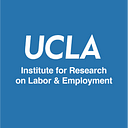Gig workers around the globe emboldened to fight following Prop 22’s win
By Breanna Diaz
While all eyes were on the results of the presidential election this past November, California’s Proposition 22 was voted into law, denying employee rights for app-based workers.
In 2019, Assembly Bill 5 established the ABC test which simplified the process of designating workers as independent contractors or employees. Under AB 5, gig workers such as Uber and Lyft drivers are considered employees, yet these corporations refused to classify them correctly.
Enter Proposition 22, funded primarily by Uber, Lyft, and DoorDash, the measure exempts drivers from AB 5 and introduces a slew of other consequences for workers. Saba Waheed, research director at the UCLA Labor Center, a unit of IRLE, who has worked on multiple studies about gig and rideshare workers, said one of the effects of the proposition is that it allows apps like Uber and Lyft to pay drivers less than minimum wage.
“If you worked an 8:00 a.m. to 5:00 p.m. day, which should be considered an eight-hour day, it doesn’t count,” Waheed said. “Only the time that you had an active passenger counts.”
Waheed said Uber and Lyft convinced drivers that if they wanted to keep their flexible work hours, they should vote for Proposition 22, even though that flexibility is still achievable under an employee model. Uber’s and Lyft’s threats to leave the state of California — and leave many drivers without income — also persuaded many to support the controversial ballot measure.
“If someone really thinks that having employee benefits is going to mean they will lose their job altogether, which was some of the messaging that came from the companies, of course you’re going to advocate for that, even if it means that you’re going to lose a bunch of other things in the process,” she said.
While the tech giants managed to persuade many current gig workers, others were not convinced. Tyler Sandness, a former Lyft driver and union organizer with Rideshare Drivers United, said Proposition 22 was firmly opposed by grassroots activists. “Prop 22 essentially is a backsliding of employment rights,” Sadness said. “That’s dangerous not just for people in the gig economy — that’s dangerous for everybody.”
While the proposition is law for now, Sandness believes there is hope that federal legislation will be passed to enforce the ABC test across the nation. Winning federal recognition of app-based workers as full employees would be tough, he said, so grassroots organizations need to work harder now than ever to advocate for workers.
“If you give up now, they win by default. How can you compete with that system where money is power? But as hard as that is, if you let them win, the future really is gone,” he said.
“If you give up now, they win by default. How can you compete with that system where money is power? But as hard as that is, if you let them win, the future really is gone,” he said.
While California is ground zero for the conflict between corporations and independent contractors, the issue of labor rights under tech-company domination has led to movements and strikes globally, including in Mexico, Argentina, Chile, and Brazil.
On December 9, the UCLA Labor Studies Program hosted the webinar “The Future of Organizing under Technological Revolution,” convening speakers and activists for their input on app-based workers’ labor rights. Martin Manteca, organizing director for the Service Employees International Union Local 721 in Los Angeles, said Proposition 22 brought together drivers from around the world to discuss and strategize about how to respond to the proposition.
“Prop 22 is a danger. It poses a real threat to the labor gains that workers across the world have gained across the century,” he said. “We’ve mapped out what 2021 is going to look like, and we’re going to be in battle with the DoorDashes of the world. ”
“Prop 22 is a danger. It poses a real threat to the labor gains that workers across the world have gained across the century,” he said. “We’ve mapped out what 2021 is going to look like, and we’re going to be in battle with the DoorDashes of the world. ”
The DoorDashes of the world are indeed gearing up to pass laws like Proposition 22 in as many places as possible. As Uber CEO Dara Khosrowshahi put it, they will “work with governments across the U.S. and the world to make this a reality.”
While the companies plan on enacting more laws similar to Proposition 22 across the globe, they will face fierce opposition. Luciana Kasai, food delivery worker and member of Brazil’s Entregadores Antifascistas worker collective, said worker activists have been able to raise awareness about how app-based delivery companies treat workers, earning support from customers who regularly use delivery apps.
“We are rising up and saying all the things that we go through. People are starting to look at us differently and actually thinking twice before ordering food,” Kasai said. Entregadores Antifascistas has also begun offering delivery services with fair prices in Brazil, she said, allowing the workers to set the rules instead of delivery app companies.
“We’re going to hit them head on,” Manteca said. “The power belongs to those who deliver for services. The power belongs to those who make a living making sure people have food to eat.”
The Institute for Research on Labor and Employment (IRLE) and Labor Center have released a series of reports focused on the gig workers and the gig economy.
